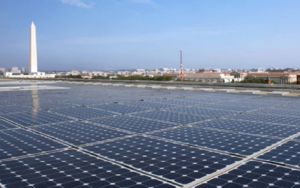 The Clean Power Plan (CPP), the signature piece of environmental regulation from the Obama Administration, is now facing an uncertain future. Following President Trump’s request for a review of the rule and the June 1st announcement that the U.S. will be leaving the Paris agreement, the President is widely expected to eliminate or significantly change the CPP. Review by the Office of Management and Budget (OMB) typically takes about 60 days, meaning that the review period may be drawing to a close.
The Clean Power Plan (CPP), the signature piece of environmental regulation from the Obama Administration, is now facing an uncertain future. Following President Trump’s request for a review of the rule and the June 1st announcement that the U.S. will be leaving the Paris agreement, the President is widely expected to eliminate or significantly change the CPP. Review by the Office of Management and Budget (OMB) typically takes about 60 days, meaning that the review period may be drawing to a close.
The CPP has faced criticism from both sides of the aisle, as well as from industry and environmental groups. A report from the Heritage Foundation called the CPP a job killer and example of government overreach, further stating that it would have absolutely no effect on the environment or climate change. In contrast, various environmental groups have also indicated that, while a step in the right direction, the CPP is insufficient.
As the OMB review draws to a close, some industry groups are speaking out that the President should not completely scrap the plan. Instead, industry is advocating for a new approach that would reduce emissions, but to a lesser extent than originally outlined in the Obama-era rule. The U.S. Chamber of Commerce is lobbying for an “inside-the-fence” revision to the CPP, which would ensure the rule only applies to changes and upgrades made inside the fenceline of existing power plants. This would place a greater emphasis on attaining efficiency improvements at coal-fired power plants. The original Clean Power Plan required emissions reductions off-site through carbon offsets and procuring renewables. The coal industry argued at the D.C. Circuit Court of Appeals, that this action would directly subsidize their competitors and ultimately lead to plant shutdowns.
The OMB review is the final step before the EPA can release the proposal for public review and comment. Any regulatory rollback of carbon emissions reductions will likely be challenged by environmentalists.
Our Carbon Capture Utilization System will remove the CO2 out of the combusted coal exhaust for less than $20 a tonne. The CO2 will be transformed into useful-saleable products. No… Read more »
The present regulations require individual States to meet projected targets by CO2 emission reduction only. This provides no incentives for Carbon Capture and Reuse (NOT to be confused with sequestration… Read more »
Our Energy Policy (who posted this discussion) should not be citing climate denier groups like the Heritage Foundation and the US Chamber of Commerce when discussing climate policy. Of course,… Read more »